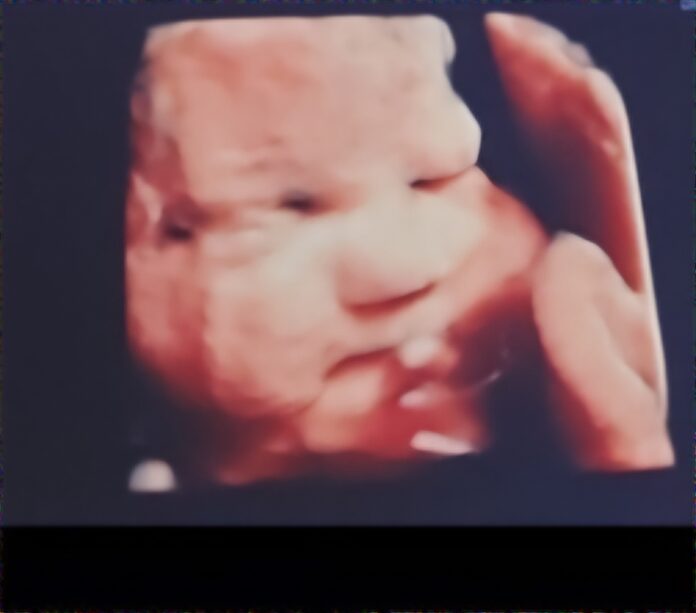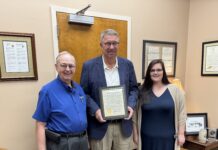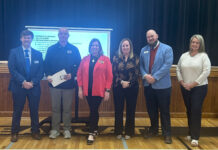
CULLMAN, Ala. – Cullman resident Holliann Letson was enjoying a typical pregnancy with her second daughter, Evelyn. At her 18-week anatomy scan – the scan often referred to as the “gender scan,” as most babies’ genders can be determined at this stage of pregnancy – Letson was hit with some devastating news. Her daughter had an anomaly near her heart.
Letson’s current provider was unable to determine what the image foretold, so she was referred to the Maternal-Fetal Medicine (MFM) division at UAB Hospital in Birmingham for further testing and evaluations into little Evelyn’s heart and the possible defect.
“They wanted to wait to see me until May 1,” shared Letson. “When that day came I got the most devastating news I’ve ever received in my life.”
During that MFM appointment is when Letson was told the anomaly near little Evelyn’s heart was congenital diaphragmatic hernia (CDH), a “birth defect that results in an abnormal opening or hole in the diaphragm, which is the muscle under the lung that aids in breathing. When the diaphragm is torn, it allows other body organs, such as the spleen, liver, kidneys, stomach and intestines, to move into the chest cavity, near the lungs. The organs push into the lungs, making it difficult to breathe, and it can even cause the lungs to collapse. The condition also can prevent lung tissue from developing fully.” (UAB)
In the same appointment, Letson was given the news that her unborn child also had a syndrome called hydrops, which “occurs when abnormal amounts of fluid build up in two or more internal areas of a fetus or newborn. It is basically congestive heart failure. Hydrops is usually a symptom of underlying problems like anatomical defects, chromosomal abnormalities, or various viruses.” (March for Babies)
Evelyn’s diagnoses left her with a less than 30% chance of survival.
Letson’s care team at UAB MFM advised the expectant mother about the possibility of treatment. Although out of state and risky, and with approval unlikely for both mom and baby, the team forwarded the referral to Texas Children’s Hospital and hoped for the best.
“I was advised that there was a procedure that could help, but from the tests and other observations, me and Evelyn most likely wouldn’t be a candidate,” said Letson. “However, they sent my referral to Texas Children’s Hospital in Houston. It would be better to go through the tests and get denied than regret the ‘what-ifs.’”
Traveling to Houston was no easy feat for the mother, with financial woes, worry for the life of her unborn daughter and the typical stressors of pregnancy. Letson was determined to complete as much testing as possible to determine her daughter’s fate. Upon arriving at Texas Children’s Hospital, Letson was met by a nurse who urgently ushered her in to meet with a doctor.
“The doctor advised me to forget all about the congenital hernia. Evelyn was misdiagnosed,” Letson said. Evelyn’s new diagnosis was one of congenital pulmonary airway malformation, a “mass of abnormal lung tissue, which may be filled with fluid or other material.” (Texas Children’s Hospital). “This prognosis is so much better, but no less immediately dangerous.”
The same day, Letson underwent urgent surgery to place a shunt in her baby’s chest cavity and relieve pressure on the heart. She was told that without the surgery and shunt placement, the fluid would slowly build and likely cause Evelyn to go into cardiac arrest within weeks.
Letson smiled and said, “I had the procedure, and the next day the fluid in her chest had decreased significantly.”
Now, more than a month after that unexpected procedure, Evelyn’s chances of survival have soared from 30% to 70%. Not quite out of the woods, Letson will travel again to Houston on the morning of Tuesday, July 23, for the third time to make delivery plans and discuss outcomes and possible treatments for Evelyn at birth.
“I will deliver in Texas and Evelyn may need surgery immediately, and we’ll be there for over two weeks for her recovery time,” she said.
At 35 weeks pregnant, Letson could go into labor at any time. Delivering at Texas Children’s Hospital is the best chance of Evelyn’s survival and ability to thrive.
Donations to Letson and her daughter can be made online to the family’s GoFundMe account, found at https://gofund.me/059c181b.
Copyright 2024 Humble Roots, LLC. All Rights Reserved.


















